Islam and wife beating
05/09/2012| IslamWeb
In the event of a family dispute, the Quran exhorts the husband to treat his wife kindly and not overlook her positive aspects [Quran 4:19]. If the problem relates to the wife's behavior, her husband may exhort her and appeal for reason. In most cases, this measure is likely to be sufficient.
In cases where the problem continues, the husband may express his displeasure in another peaceful manner, by sleeping in a separate bed from hers. There are cases however, in which a wife persists in deliberate mistreatment and expresses contempt of her husband and disregard for her marital obligations.
Instead of divorce, the husband may resort to another measure that may save the marriage, at least in some cases. Such a measure is more accurately described as a gentle tap on the body, but never on the face, making it more of a symbolic measure then a punitive one.
Following is the related Quranic text (which means): "Men are the protectors and maintainers of women. Because Allah has given the one more (strength) than the other, and because they support them from their means. Therefore the righteous women are devoutly obedient, and guard in (the husband's) absence what Allah would have them guard. As to those women on whose part you fear disloyalty and ill-conduct, admonish them (first), (next) do not share their beds, (and last) beat (tap) them (lightly); but if they return to obedience, seek not against them means (of annoyance): for Allah is Most High, Great (above you all)." [Quran 4:34]
Even here, that maximum measure is limited by the following:
1. It must be seen as a rare exception to the repeated exhortation of mutual respect, kindness and good treatment, discussed earlier.
Based on the Quran and narration, this measure may be used in the cases of lewdness on the part of the wife or extreme refraction and rejection of the husband's reasonable requests on a consistent basis. Even then, other measures, such as exhortation, should be tried first.
2. As defined by narration, it is not permissible to strike anyone's face, cause any bodily harm, or even be harsh. What the narration qualified as light striking, was interpreted by early jurists as a (symbolic) use of Miswaak (a small natural toothbrush)! They further qualified permissible "striking" as that which leaves no mark on the body.
It is interesting that this latter fourteen-centuries-old qualifier is the criterion used in contemporary American law to separate a light and harmless tap or strike from "abuse" in the legal sense. This makes it clear that even this extreme, last resort, and "lesser of the two evils" measure that may save a marriage, does not meet the definitions of "physical abuse," "family violence, " or "wife battering" in the 20th century law in liberal democracies, where such extremes are so commonplace that they are seen as national concerns!
3. The permissibility of such symbolic expression of the seriousness of continued refraction does not imply its desirability. In several narrations, Prophet Muhammad ![]() (may Allah exalt his mention) discouraged this measure. Among his sayings are the following: "Do not beat the female servants of Allah;" "Some (women) visited my family complaining about their husbands (beating them). These (husbands) are not the best of you;" and also, "[It is a shame that] one of you beats his wife like [an unscrupulous person] beats a slave and maybe he sleeps with her at the end of the day." [Riyadh Al-Saaliheen]
(may Allah exalt his mention) discouraged this measure. Among his sayings are the following: "Do not beat the female servants of Allah;" "Some (women) visited my family complaining about their husbands (beating them). These (husbands) are not the best of you;" and also, "[It is a shame that] one of you beats his wife like [an unscrupulous person] beats a slave and maybe he sleeps with her at the end of the day." [Riyadh Al-Saaliheen]
In another narration the Prophet ![]() said :... "How does anyone of you beat his wife as he beats the stallion camel and then he may embrace (sleep with) her?..." [Al-Bukhari].
said :... "How does anyone of you beat his wife as he beats the stallion camel and then he may embrace (sleep with) her?..." [Al-Bukhari].
4. True following of the Sunnah is to follow the example of the Prophet Muhammad ![]() who never resorted to that measure, regardless of the circumstances.
who never resorted to that measure, regardless of the circumstances.
5. Islamic teachings are universal in nature. They respond to the needs and circumstances of diverse times, cultures and circumstances. Some measures may work in some cases and cultures or with certain persons but may not be effective in others. By definition, a "permissible" act is neither required, encouraged nor forbidden. In fact it may be better to spell out the extent of permissibility, such as in the issue at hand, rather than leaving it unrestricted and unqualified or ignoring it all together. In the absence of strict qualifiers, persons may interpret the matter in their own way, which can lead to excesses and real abuse.
6. Any excess, cruelty, family violence or abuse committed by any "Muslim" can never be traced, honestly, to any revelatory text (Quran or narration). Such excesses and violations are to be blamed on the person(s) himself, as it shows that they are paying lip service to Islamic teachings and injunctions and failing to follow the true Sunnah of the Prophet ![]() .
.
By Dr. Jamal Badawi

